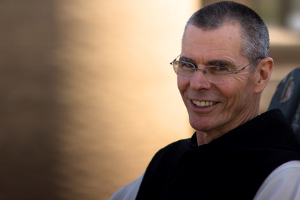Mass of the Lord
[Scripture Readings: Ex 12:1-8, 11-14; 1 Cor 11:23-26; John 13:1-15]

"This is my Body that is for you."
These were Jesus' words at his Last Supper. We heard them in our second reading. We hear them every day at Mass. We cannot imagine how many times these words have been said since that first Lord's Supper. It is probably true to say that before that Last Supper of Jesus those words had never been said, and certainly never in such a way that they would be remembered and repeated by human communities and in every language ever since, words that bond communities and persons to one another who otherwise have nothing in common, words linking first-century Asia Minor with twenty-first century eastern Iowa.
General Patton told his troops, "You don't win wars by dying for your country but by making the other guy die for his." "This is my Body that is given up for you." Jesus said something entirely new and unexpected under the sun. His words upset the DNA of human history for ever more. His words drunk and eaten in the Eucharistic meal inspire, call, challenge, enliven, and empower us, even as they stick in our throats, to do the same, to say the same: "My Body, for you," or, in the version we have from Saint John, at the washing of the feet, "as I have done for you, you should also do for one another."
"This is my Body that is for you." In the language of logic, this phrase is a tautology. That means that the two parts say the same thing. At least, so it is ever since Jesus said and, what's more, did them. For what is a Body, what is a human Body, if not precisely "for" the other? But even an introductory course in human development tells us what we know without asking, that every person has a need and a desire to give life. We call it generativity. Parenthood is the most obvious symbol of this need fulfilled, but there's also artistic creation, ministry and service, education, prayer and suffering, all of these done through and in the Body. What most of us succeed in doing in some small and partial way, and often, it seems, almost too late, and always qualified by some holding back in selfishness, Jesus did "to the end," emptied himself, so that we might have life to the full.
We live by another's death in the same way that food to nourish us must first be destroyed in being consumed. It was not for nothing that Jesus chose a meal with Bread and Wine to reveal the meaning of his self-oblation on the Cross for the Life of the World. As Christians, in our deepest reality, we live by another's death. Far from this fact making us feel beholden, it emboldens us to "do as I have done," to give our bodies for others or, at least, to live well.
That line is from the movies Saving Private Ryan. At the end of the movie Ryan is now an old man. He is visiting the cemetery where those who had saved his life are buried. He says to his wife, "Tell me I have lived well." How can we live poorly, remembering and repeating day by day, "This is my Body that is for you"? Far from the Eucharistic Bread and Wine being symbols, it is rather the case that our timid, well-meant, always inadequate, yet always acceptable efforts to live well are symbols of the explosive reality that the Eucharist is - My Body for you.
